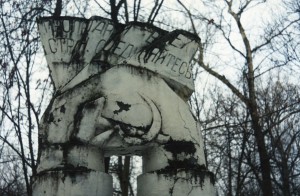 The Atlantic’s Ta-Nehisi Coates has just been reading Tony Judt’s Postwar (which I have yet to tackle, but plan to) and cites that book, together with Tim Snyder’s Bloodlands (which I reviewed here) for a grander thesis about the failings European civilization. There’s a lot to take issue with there, to put it mildly, but I did like this:
The Atlantic’s Ta-Nehisi Coates has just been reading Tony Judt’s Postwar (which I have yet to tackle, but plan to) and cites that book, together with Tim Snyder’s Bloodlands (which I reviewed here) for a grander thesis about the failings European civilization. There’s a lot to take issue with there, to put it mildly, but I did like this:
I don’t have any gospel of my own. Postwar, and the early pages of Bloodlands, have revealed a truth to me: I am an atheist. (I have recently realized this.) I don’t believe the arc of the universe bends towards justice. I don’t even believe in an arc. I believe in chaos. I believe powerful people who think they can make Utopia out of chaos should be watched closely.
Oh yes.
Coates then lets what seems like despair grip him as a result of this discovery (odd, as if that is how things are, it’ll be a bit of a relief):
I don’t know that it all ends badly. But I think it probably does.
Not necessarily. Chin up!
But then he brightens:
I’m also not a cynic. I think that those of us who reject divinity, who understand that there is no order, there is no arc, that we are night travelers on a great tundra, that stars can’t guide us, will understand that the only work that will matter, will be the work done by us.
And gets it:
Or perhaps not.

This is recognizably the existentialist’s journey. To hell and back (maybe), so to speak. Yes: chin up! Resolute humanism has some redeeming value.